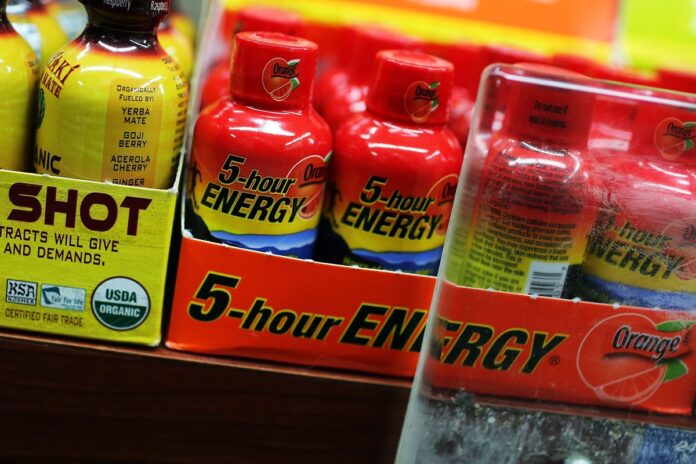
Case Briefing
- A federal judge dismissed Vitamin Energy’s lawsuit against 5-Hour Energy with prejudice, closing the case.
- Judge Grey found the alleged antitrust injury “speculative” and called 5-Hour’s ads classic puffery.
- Dismissal with prejudice blocks amendment opportunities, forcing Vitamin Energy to consider appellate options to revive competition claims
By Samuel Lopez · USA Herald
(September 3, 2025)
A Michigan federal judge has thrown out Vitamin Energy’s high-profile antitrust and false advertising lawsuit against 5-Hour Energy and its founder Manoj Bhargava , dealing a sharp setback to the challenger brand’s efforts to chip away at its rival’s market dominance.
In a 32-page opinion issued August 29, 2025, U.S. District Judge Jonathan J.C. Grey ruled that Vitamin Energy failed to plead a cognizable antitrust injury and dismissed the case with prejudice, meaning the company cannot refile. “Vitamin Energy’s speculations about the importance of counter placement, with no additional factual support, fail to establish antitrust standing,” Judge Grey wrote.
Vitamin Energy had alleged that 5-Hour Energy and its related companies—Living Essentials, International IP Holdings, and Innovation Ventures—used exclusive placement deals with major retailers such as Pilot, Casey’s, and Huck’s to monopolize the two-ounce energy shot market.
According to the complaint, after Vitamin Energy secured a 2020 Pilot contract to display its products on checkout counters, 5-Hour Energy allegedly induced Pilot to remove Vitamin’s racks and replace them with its own, offering millions in rebates to secure exclusivity. Vitamin claimed its sales dropped 30% at Pilot from 2020 to 2021 as a result.
But Judge Grey found the loss insufficient to show market-wide harm: “A 30% decrease in profit over a single year can hardly substantiate an antitrust injury without additional factual support.”
The court also emphasized that Vitamin Energy admitted it had entered into its own counter-rack placement deals with Pilot, mirroring the very arrangements it claimed were unlawful. “Oddly, Vitamin Energy admits that it entered into a counter rack placement and rebate agreement with Pilot that mirrors Defendants’ allegedly anticompetitive agreements,” the judge observed.
Vitamin Energy also challenged 5-Hour’s advertising, particularly its “Fixes Tired Fast” slogan and the “Get Back to 100% Energy” campaign featuring battery-meter graphics. But Judge Grey concluded these were puffery—marketing exaggerations not meant to be taken literally.
“Being tired, which is an unavoidable state of human existence, could not be reasonably eradicated with an energy drink,” he wrote. The court found the phrase “Fixes Tired Fast” too ambiguous to be deemed false, noting that “fast” is subjective and “tired” can mean many things.
Similarly, the “100% Energy” ads were deemed symbolic, not measurable scientific claims. The use of percentages “evokes comparisons to a cellphone battery, and seems to symbolically convey that 5-hour Energy would make a consumer feel ‘recharged,’” the judge reasoned.
With the antitrust and false advertising counts dismissed, the court also rejected Vitamin Energy’s civil conspiracy allegations. Judge Grey explained that conspiracy claims require an underlying unlawful act, and since the core claims failed, conspiracy could not stand.
Perhaps most damaging for Vitamin Energy was the court’s decision to close the case outright. “The Court finds it futile to grant Vitamin Energy leave to amend their complaint because no plausible antitrust injury exists… and no plausible false advertising claims exist,” Judge Grey wrote. “Accordingly, Vitamin Energy’s complaint is DISMISSED WITH PREJUDICE.”
This finality means Vitamin cannot revive its claims in the district court. Its only avenue now is appeal to the Sixth Circuit.
For the energy shot market, Judge Grey’s decision reinforces the line between aggressive competition and illegal monopolization. Exclusive counter placement deals—common in retail—were upheld as legitimate so long as competitors remain on store shelves.
The ruling also underscores the difficulty of challenging marketing slogans under the Lanham Act. Courts routinely classify catchy slogans and exaggerated claims as puffery, leaving rivals with little recourse absent hard scientific misrepresentation.
As for defendants, the dismissal eliminates a costly litigation risk and preserves their dominant market position. Manoj Bhargava and Innovation Ventures walk away with a clean slate, at least from this round.
Vitamin Energy is represented by contract litigation experts Steven Susser and Jessica Fleetham of Evia Law PLC.
Defendants (5-Hour Energy et al.) are represented by Marc Lorelli, Thomas W. Cunningham, Chelsea E. Pasquali, Christopher C. Smith, and Francesca M. Cusumano of Brooks Kushman PC.
Case: Vitamin Energy, Inc. v. Bhargava et al., No. 2:24-cv-13125, U.S. District Court for the Eastern District of Michigan.


